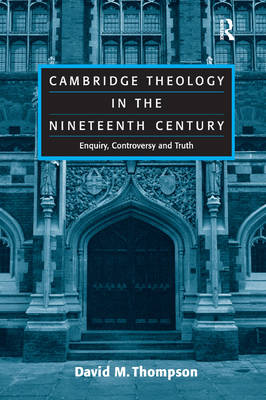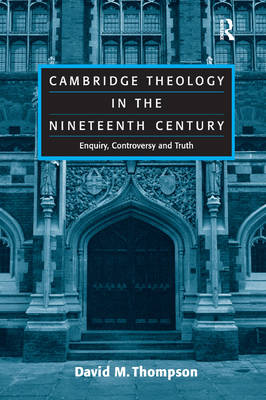
Door een staking bij bpost kan je online bestelling op dit moment iets langer onderweg zijn dan voorzien. Dringend iets nodig? Onze winkels ontvangen jou met open armen!
- Afhalen na 1 uur in een winkel met voorraad
- Gratis thuislevering in België vanaf € 30
- Ruim aanbod met 7 miljoen producten
Door een staking bij bpost kan je online bestelling op dit moment iets langer onderweg zijn dan voorzien. Dringend iets nodig? Onze winkels ontvangen jou met open armen!
- Afhalen na 1 uur in een winkel met voorraad
- Gratis thuislevering in België vanaf € 30
- Ruim aanbod met 7 miljoen producten
Zoeken
Cambridge Theology in the Nineteenth Century
Enquiry, Controversy and Truth
David M Thompson
Paperback | Engels
€ 64,95
+ 129 punten
Uitvoering
Omschrijving
Many books have been written about nineteenth-century Oxford theology, but what was happening in Cambridge? This book provides the first continuous account of what might be called 'the Cambridge theological tradition', by discussing its leading figures from Richard Watson and William Paley, through Herbert Marsh and Julius Hare, to the trio of Lightfoot, Westcott and Hort. It also includes a chapter on nonconformists such as Robertson Smith, P.T. Forsyth and T.R. Glover. The analysis is organised around the defences that were offered for the credibility of Christianity in response to hostile and friendly critics. In this period the study of theology was not yet divided into its modern self-contained areas. A critical approach to scripture was taken for granted, and its implications for ecclesiology, the understanding of salvation and the social implications of the Gospel were teased out (in Hort's phrase) through enquiry and controversy as a way to discover truth. Cambridge both engaged with German theology and responded positively to the nineteenth-century 'crisis of faith'.
Specificaties
Betrokkenen
- Auteur(s):
- Uitgeverij:
Inhoud
- Aantal bladzijden:
- 222
- Taal:
- Engels
Eigenschappen
- Productcode (EAN):
- 9781138379176
- Verschijningsdatum:
- 10/06/2019
- Uitvoering:
- Paperback
- Formaat:
- Trade paperback (VS)
- Afmetingen:
- 155 mm x 231 mm
- Gewicht:
- 317 g

Alleen bij Standaard Boekhandel
+ 129 punten op je klantenkaart van Standaard Boekhandel
Beoordelingen
We publiceren alleen reviews die voldoen aan de voorwaarden voor reviews. Bekijk onze voorwaarden voor reviews.











